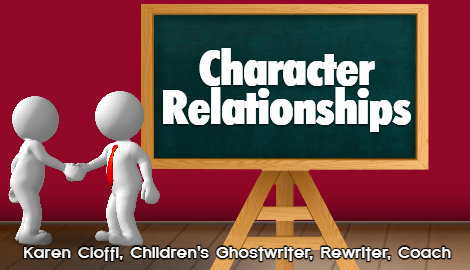Character relationships are crucial in fiction. Threads of emotion, conflict, and growth are woven together, giving substance to your story. Without character relationships, you wouldn’t have a story. One might bring up “Cast Away” with Tom Hanks (a movie I love), explaining that the protagonist was alone in most of that movie. But the volleyball was a character, yes, inanimate, but still a character. It doesn’t matter if the story unfolds in the realms of fantasy, science fiction, or the everyday world; the relationships between characters add depth, complexity, and relatability to the narrative. In other words, the character relationships, whether between best friends, love interests, family, antagonists, or others, create a connection with the reader, and that relatability mentioned. So, let’s take a deeper look at these relationships. THE SIGNIFICANCE OF CHARACTER RELATIONSHIPS At the core of every compelling story are the characters and their interactions. Character relationships serve as a powerful vehicle for conveying emotions and driving the plot forward. They also provide a mirror through which readers can reflect on their own experiences and relationships. If written well, character dynamics create feelings or thoughts that stay with the audience, making the fictional world feel authentic and alive. TYPES OF CHARACTER RELATIONSHIPS Friendship: Friendship is a timeless and universal theme in fiction. From the camaraderie in J.K. Rowling's "Harry Potter" series to the bond between Frodo and Sam in J.R.R. Tolkien's "The Lord of the Rings," friendships often serve as the story’s foundation. These relationships delve into loyalty, trust, and strength that comes from shared experiences. In some instances, these friendships change the characters for the better. In the fantasy chapter book “Walking Through Walls,” the protagonist is lazy, selfish, and even unethical. But a new friendship with someone who is loyal, ethical, selfless, and honorable changes his perspective, helping him grow through the story’s journey. Romance: This genre is a staple in fiction, encompassing a wide range of emotions from passion to heartbreak. Classic examples like Elizabeth Bennet and Mr. Darcy in Jane Austen's "Pride and Prejudice" convey how romantic relationships can drive character development. They explore themes of love, sacrifice, and personal growth. While not all romance stories end happily, if written well, they have the passion and substance to keep the reader captivated. Family: Family relationships form the backbone of many stories, demonstrating the complexities and complications of blood ties. Works like "The Godfather" by Mario Puzo or "To Kill a Mockingbird" by Harper Lee are classic examples of family complexities. There is also "The Hand of the Sun King" by J.T. Greathouse. This is more of an internal battle for Wen Alder, the protagonist. He must choose between his grandmother's arcane tribal customs or illegal imperial arts, both of which he’s grown up with. Family bonds conveyed in stories can bring about moral dilemmas, cultural clashes, and the dynamics of power and authority. Mentorship: Mentor-mentee relationships are prevalent in fiction, illustrating the transfer of knowledge and wisdom from one generation to another. Or from one person to another. In J.R.R. Tolkien's "The Hobbit," Bilbo Baggins is guided by the wise Gandalf, demonstrating how mentorship can transform a character. Other novels delving into mentorship relationships include "Forest Gump" by Winston Groom. The protagonist is mentored by his platoon leader, Lieutenant Dan, and forms a long-lasting relationship. And "Dead Poets Society" by Nancy H. Kleinbaum. A class of boys are mentored by their English teacher, encouraging them to find their passion. Rivalry: Rivalries add conflict and competition to your story. It propels the story forward with tension and intrigue. Consider the rivalry between Sherlock Holmes and Moriarty in Arthur Conan Doyle's detective stories. There’s the ongoing battle between Harry Potter and Draco Malfoy. There is also Batman and Joker, Luke Skywalker and Darth Vader, and Robin Hood and Sheriff Nottingham. The rivalry in all these stories drives the story forward. It engages the reader and keeps him turning the pages. IMPACT ON CHARACTER DEVELOPMENT Character relationships provide the foundation for growth and change. Through interactions with others, characters confront challenges, discover their strengths and weaknesses, and evolve over the course of the story. Whether it's overcoming conflicts in a friendship or navigating a romantic relationship, these interconnections create multidimensional and relatable characters. In addition, character relationships reflect the different facets of a character's personality. The interactions between a character's interactions with friends, family, and adversaries add depth to the character. READER ENGAGEMENT AND EMPATHY One of the most significant impacts of well-crafted character relationships is the emotional connection they forge with readers. When characters experience love, loss, joy, or betrayal, readers empathize with these emotions on a personal level. It fosters a sense of intimacy between the reader and the fictional world, making the narrative more immersive and memorable. Readers often find solace or inspiration in characters who navigate relationships with resilience and authenticity. The struggles and triumphs of the characters become a mirror for readers to reflect on their own lives. SUMMING IT UP Character relationships help bring your story to life through emotions, conflicts, and growth. As the readers immerse themselves in the relationships portrayed, it can touch their lives and give them insight into their relationships.

I’m a working children’s ghostwriter, editor, and coach. I can help turn your story into a book you’ll be proud to be the author of, one that’s publishable and marketable.
OTHER HELP I OFFER:
FICTION WRITING FOR CHILDREN COURSE
A guided self-study course and mentoring program.
HOW TO WRITE A CHILDREN’S FICTION BOOK
A DIY book to help you write your own children’s book.
WRITERS ON THE MOVE PRESS.
Self-publishing help for children’s authors.
You can contact me at: kcioffiventrice@gmail.com. Or give me a call at 347—834—6700. (Please leave a message- I’ll get back to you as soon as I can.)

